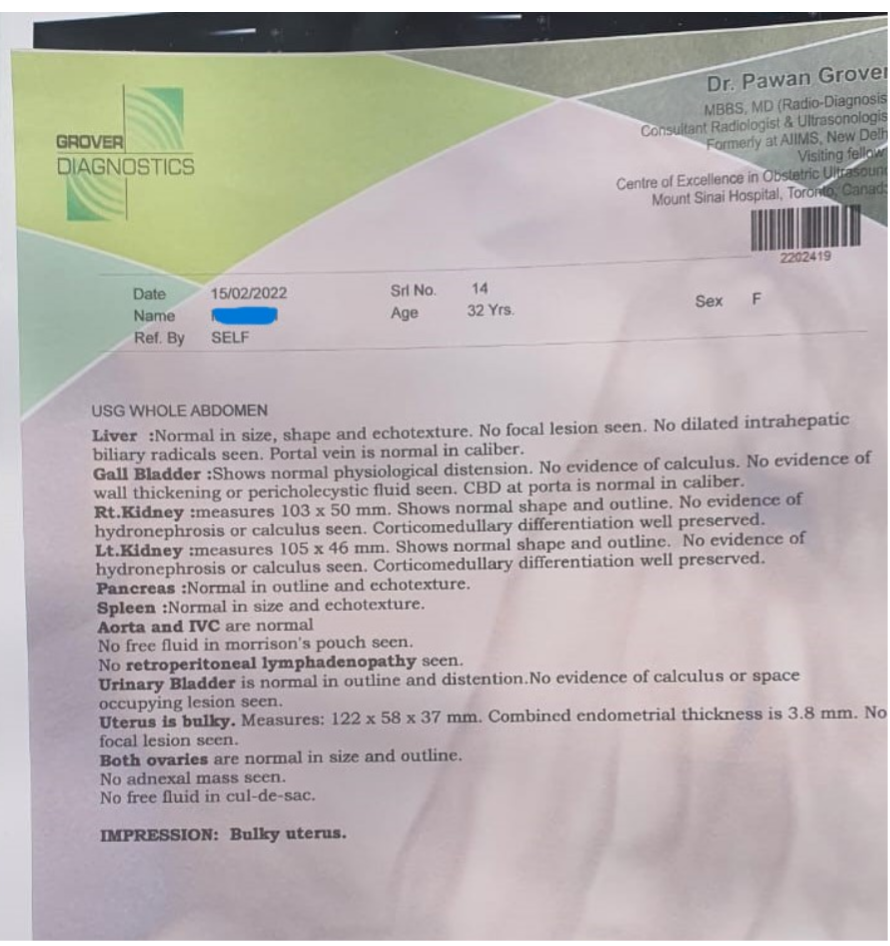Abstract
The following case report is to establish how individualised homoeopathic medicines can prove to be beneficial in treatment of renal stones. A 32-year-old lady suffering from renal stone was prescribed individualized homeopathic remedy which proved to be beneficial in managing acute symptoms of kidney stone and treat the same, as well as helped the patient to take a new lease on life through constitutional treatment preventing its recurrence.
Keywords:
Renal stone, Homeopathy, Berberis vulgaris.
Introduction
Kidney stones are hard deposits of minerals and acid salts which may develop anywhere along the urinary tract (kidneys, ureters, bladder, and urethra) stick together in concentrated urine. They may occur in 1 in 10 people at some time in their life. The patient may complain of severe pain in flanks, when the stone is passing through the urinary tract, often associated with burning during urination, nausea, vomiting, etc. Along with general management, numerous homeopathic medicines such as Berberis vulgaris, Lycopodium clavatum, Nux vomica, Cantharis, Bryonia alba, Hydrangea, Tabacum, Sarsaparilla, etc. prescribed symptomatically help to cure such cases easily.
Case study
The patient presented with recurrent, severe pain in left iliac region, frequent and painful urination along with distended abdomen for 5 days. Her ultrasonography revealed three calculi, largest being 5.6mm in the upper pole calyx of left kidney. She had a history of umbilical hernia for which she got operated recently. After considering the totality of symptoms, using the knowledge of Materia Medica, Organon and Repertory, she was prescribed a dose of Berberis vulgaris 30C on the day of visit along with placebo as well as advised to drink plenty of fluids. She had no episode of pain up next 4 days, after which she again had an acute onset of renal colic. She was given three doses of Berberis vulgaris 200C.
Remedy Selection
Berberis vulgaris helps in soothing the pain in the lower back or the pain that shoots towards the bladder. It also helps in reducing the bubbling sensation and relieves the other discomforts caused due to kidney stones. Berberis vulgaris effectively soothes the burning sensation and pain in the ureters and the urethra that arises due to kidney stones. It proves to be effective in relieving symptoms such as Burning pains. Sensation as if some urine remained after urinating. Urine with thick mucus and bright-red, mealy sediment. Bubbling, sore sensation in kidneys. Pain in bladder region. Pain in the thighs and loins on urinating. Frequent urination; urethra burns when not urinating.
The next day, she reported of some particles in the urine. Still, she was continued placebo and asked to get the USG done after 6 months. She was continued placebo for 5 months, after which she again had a mild pain in left flank with nausea, a dose of Berberis vulgaris 200C was prescribed again. After 6 months, her USG revealed no calculus in kidneys but a bulky uterus. Now she is under treatment for the same.
Results
The above case of a lady suffering from kidney stones responded well to Berberis vulgaris prescribed on basis of totality of symptoms and was treated in 6-7 months. (Investigations enclosed)

Before Treatment

Conclusion
The individualized homeopathic treatment proves to be effective in treating renal stones. The similimum remedy chosen during the acute presentation of the disease, not only alleviated the patient at that time, but also prevented the recurrence of any such episode till date. There are many known homoeopathic medicines for their management, but their potential has not been properly documented. Hence, extensive research on renal stones and homeopathy would provide better results.
About the Author:

Dr Yashika Arora Malhotra
BHMS (NHMC, DU)
MD (Hom) (DKMMHMC, MUHS)
STSH Scholarship Awardee by CCRH (2015-16)
